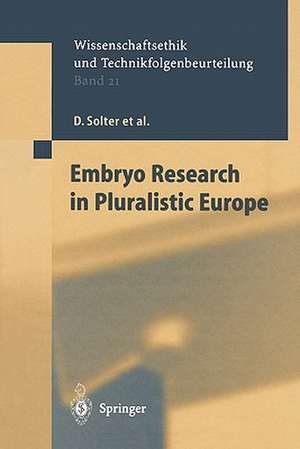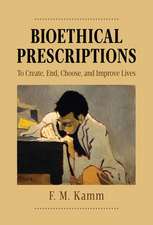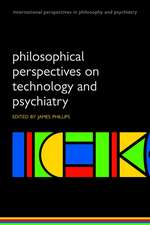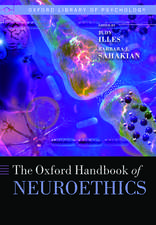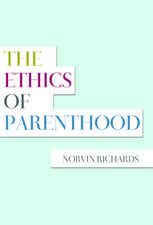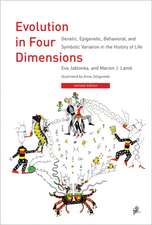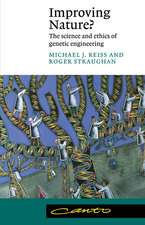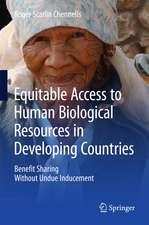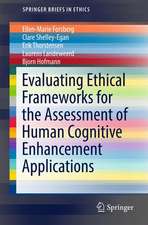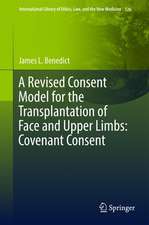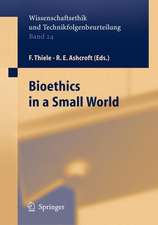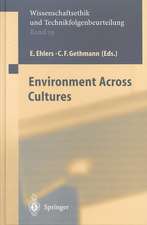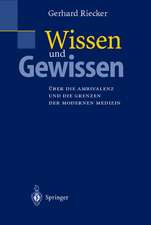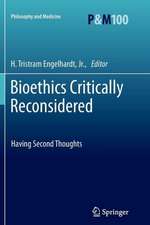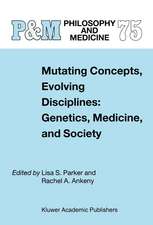Embryo Research in Pluralistic Europe: Ethics of Science and Technology Assessment, cartea 21
Katharina Mader Autor D. Solter, D. Beyleveld, M.B. Friele, J. Holówka, H. Lilie, R. Lovell-Badge, C. Mandla, U. Martin, R. Pardo Avellanedaen Limba Engleză Paperback – 4 dec 2010
| Toate formatele și edițiile | Preț | Express |
|---|---|---|
| Paperback (1) | 396.78 lei 6-8 săpt. | |
| Springer Berlin, Heidelberg – 4 dec 2010 | 396.78 lei 6-8 săpt. | |
| Hardback (1) | 402.98 lei 6-8 săpt. | |
| Springer Berlin, Heidelberg – 28 noi 2003 | 402.98 lei 6-8 săpt. |
Din seria Ethics of Science and Technology Assessment
- 15%
 Preț: 439.70 lei
Preț: 439.70 lei - 18%
 Preț: 796.13 lei
Preț: 796.13 lei -
 Preț: 392.21 lei
Preț: 392.21 lei -
 Preț: 350.12 lei
Preț: 350.12 lei - 5%
 Preț: 368.00 lei
Preț: 368.00 lei - 20%
 Preț: 709.13 lei
Preț: 709.13 lei -
 Preț: 386.22 lei
Preț: 386.22 lei - 15%
 Preț: 714.02 lei
Preț: 714.02 lei -
 Preț: 478.05 lei
Preț: 478.05 lei -
 Preț: 489.30 lei
Preț: 489.30 lei -
 Preț: 389.70 lei
Preț: 389.70 lei - 15%
 Preț: 469.91 lei
Preț: 469.91 lei - 15%
 Preț: 643.00 lei
Preț: 643.00 lei -
 Preț: 402.98 lei
Preț: 402.98 lei -
 Preț: 393.90 lei
Preț: 393.90 lei -
 Preț: 407.19 lei
Preț: 407.19 lei -
 Preț: 384.86 lei
Preț: 384.86 lei -
 Preț: 386.61 lei
Preț: 386.61 lei -
 Preț: 402.38 lei
Preț: 402.38 lei - 15%
 Preț: 657.73 lei
Preț: 657.73 lei - 18%
 Preț: 747.20 lei
Preț: 747.20 lei - 5%
 Preț: 737.69 lei
Preț: 737.69 lei - 15%
 Preț: 449.83 lei
Preț: 449.83 lei -
 Preț: 384.86 lei
Preț: 384.86 lei - 15%
 Preț: 504.99 lei
Preț: 504.99 lei - 5%
 Preț: 366.70 lei
Preț: 366.70 lei - 5%
 Preț: 724.50 lei
Preț: 724.50 lei - 18%
 Preț: 740.11 lei
Preț: 740.11 lei - 15%
 Preț: 473.49 lei
Preț: 473.49 lei -
 Preț: 405.06 lei
Preț: 405.06 lei
Preț: 396.78 lei
Nou
Puncte Express: 595
Preț estimativ în valută:
75.93€ • 82.45$ • 63.78£
75.93€ • 82.45$ • 63.78£
Carte tipărită la comandă
Livrare economică 22 aprilie-06 mai
Preluare comenzi: 021 569.72.76
Specificații
ISBN-13: 9783642057984
ISBN-10: 3642057985
Pagini: 452
Ilustrații: XVI, 436 p.
Dimensiuni: 155 x 235 x 24 mm
Greutate: 0.62 kg
Ediția:Softcover reprint of hardcover 1st ed. 2003
Editura: Springer Berlin, Heidelberg
Colecția Springer
Seria Ethics of Science and Technology Assessment
Locul publicării:Berlin, Heidelberg, Germany
ISBN-10: 3642057985
Pagini: 452
Ilustrații: XVI, 436 p.
Dimensiuni: 155 x 235 x 24 mm
Greutate: 0.62 kg
Ediția:Softcover reprint of hardcover 1st ed. 2003
Editura: Springer Berlin, Heidelberg
Colecția Springer
Seria Ethics of Science and Technology Assessment
Locul publicării:Berlin, Heidelberg, Germany
Public țintă
ResearchCuprins
Summary.- Zusammenfassung.- 1 Theoretical and Practical Possibilities in Human Embryo Experimentation.- 2 Adult and Embryonic Stem Cells: Clinical Perspectives.- 3 The Regulation of Embryo Research in Europe: Situation and Prospects.- 4 Attitudes toward Embryo Experimentation in Europe.- 5 Toward a Rational Debate on Embryo Research.- 6 Recommendations.- 7 Glossary.- 8 Appendices.- 9 References.- List of Authors.
Textul de pe ultima copertă
Recent advances in techniques and understanding in the fields of genetics, embryology and reproductive biology have opened up new ways to treat a wide range of medical problems. They range from new options for infertility treatment and pre-implantation genetic diagnosis to stem-cell-based therapies for debilitating diseases. Since all these approaches involve the manipulation of human gametes, embryos or embryonic cells, and could also permit more contentious uses, they have stimulated a controversial debate as to what aims are desirable and to what extent experiments on human embryos are morally permissible, if permissible at all. The situation is further complicated by the fact that scientific projects are increasingly realized through international co-operation and that patients are increasingly ready to seek morally contentious medical treatment wherever it is available and thus to bypass national legislation. In view of this situation the Europäische Akademie assembled a temporary interdisciplinary project group in which scientists from universities and non-university research organizations in Europe working on the relevant subjects were brought together and charged with establishing a knowledge base and providing suggestions for long-term solutions that would be acceptable for society. Presented here are the results of this project, ranging from a discussion of the theoretical and practical possibilities in human-embryo experimentation and its alternatives in research on adult stem cells, a comparison of the situations and prospects of regulation of embryo research in Europe, a survey of European public attitudes, and a philosophical analysis of the arguments and argumentative strategies used in the debate.
Caracteristici
Includes supplementary material: sn.pub/extras
